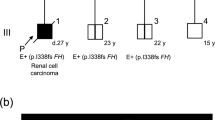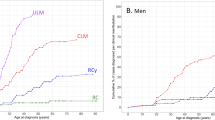Abstract
Hereditary Leiomyomatosis and Renal Cell Cancer Syndrome (HLRCC) is a rare disease and since the first report, it has been found in just over 200 families approximately, around the world (Smit et al. in Clin Genet 79:49–59, 2009). Patients in Colombia or in Latin America have not been described, as far as we know. HLRCC is inherited in an autosomal dominant manner, and it is caused by heterozygous germline mutations in the FH gene, which encodes the fumarate hydratase enzyme. It is characterized mainly by the appearance of cutaneous and uterine leiomyomas, and an early-onset, aggressive form of type 2- papillary renal cell carcinoma (Smit et al. in Clin Genet 79:49–59, 2009; Schmidt and Linehan in Int J Nephrol Renovasc Dis 7:253–260, 2014]. We report a Colombian family with HLRCC syndrome, with a novel mutation in FH gene (c.1349_1352delATGA) in which cutaneous leiomyomas have not been found, but other clinical manifestations such as type 2- papillary renal cell carcinoma, uterine leiomyomas and rare tumors were present. This investigation constitutes the first report of HLRCC syndrome in Colombia, and probably in Latin America.


Similar content being viewed by others
Abbreviations
- HLRCC:
-
Hereditary leiomyomatosis and renal cell cancer
- NRF2 :
-
Factor erythroid 2-related factor 2
- AMPK :
-
AMP-activated protein kinase
- PCR:
-
Polymerase chain reaction
- PHD:
-
Prolyl hydroxylases
- HIF-1a :
-
Hypoxia inducible factor 1 alpha
- 2SC:
-
2 Succinyl-cysteine
- CT:
-
Computed tomography
- WT:
-
Wild Type sequence
- GLUT1 :
-
Glucose transporter 1
- VEGF :
-
Vascular endothelial growth factor
- KEAP 1 :
-
Kelchlike ECH associated protein 1
- ROS:
-
Reactive oxygen species
- GISTs:
-
Gastrointestinal stromal tumors
References
Smit DL, Mensenkamp AR, Badeloe S, Breuning MH, Simon MEH, van Spaendonck KY et al (2011) Hereditary leiomyomatosis and renal cell cancer in families referred for fumarate hydratase germline mutation analysis. Clin Genet 79:49–59
Schmidt LS, Linehan WM (2014) Hereditary leiomyomatosis and renal cell carcinoma. Int J Nephrol Renovasc Dis 7:253–260
Toro JR, Nickerson ML, Wei MH, Warren MB, Glenn GM, Turner ML et al (2003) Mutations in the fumarate hydratase gene cause hereditary leiomyomatosis and renal cell cancer in families in North America. Am J Hum Genet 73:95–106
De Velasco G, Muñoz C, Sepúlveda JM, Castellano D (2015) Sequential treatments in hereditary leiomyomatosis and renal cell carcinoma (HLRCC): case report and review of the literature. Can Urol Assoc J 9:3–4
Tomlinson IP, Alam NA, Rowan AJ, Barclay E, Jaeger EE, Kelsell D et al (2002) Germline mutations in FH predispose to dominantly inherited uterine fibroids, skin leiomyomata and papillary renal cell cancer. Nat Genet 30:406–410
Linehan WM, Rouault TA (2013) Molecular pathways: fumarate hydratase-deficient kidney cancer—targeting the Warburg effect in Cancer. Clin Cancer Res 19(13):3345–3352
Bardella C, El-Bahrawy M, Frizzell N, Adam J, Ternette N, Hatipoglu E et al (2011) Aberrant succination of proteins in fumarate hydratase-deficient mice and HLRCC patients is a robust biomarker of mutation status. J Pathol 225:4–11
Adam J, Hatipoglu E, O’Flaherty L, Ternette N, Sahgal N, Lockstone H et al (2011) Renal cyst formation in Fh1-deficient mice is independent of the Hif/Phd pathway: roles for fumarate in KEAP1 succination and Nrf2 signaling. Cancer Cell 20:524–537
Alam NA, Rowan AJ, Wortham NC, Pollard PJ, Mitchell M, Tyrer JP et al (2003) Genetic and functional analyses of FH mutations in multiple cutaneous and uterine leiomyomatosis, hereditary leiomyomatosis and renal cancer, and fumarate hydratase deficiency. Hum Mol Genet 12:1241–1252
Menko FH, Maher ER, Schmidt LS, Middelton LA, Aittomaki K, Tomlinson I et al (2014) Hereditary leiomyomatosis and renal cell cancer (HLRCC): renal cancer risk, surveillance and treatment. Fam Cancer 13:637–644
Alrashdi I, Levine S, Paterson J, Saxena R, Patel SR et al (2010) Hereditary leiomyomatosis and renal cell carcinoma: very early diagnosis of renal cancer in a paediatric patient. Fam Cancer 9:239–243
Committe on Bioethics, Committee on Genetics, the American College of Medical Genetics and Genomics Social, Ethical and Legal Issues Committee (2013) Ethical and policy issues in genetic testing and screening of children. Pediatrics. doi:10.1542/peds.2012-3680
Alam NA, Barclay E, Rowan AJ, Tyrer JP, Calonje E, Manek S et al (2005) Clinical features of multiple cutaneous and uterine leiomyomatosis: an underdiagnosed tumor syndrome. Arch Dermatol 141:199–206
Wei MH, Toure O, Glenn GM, Pithukpakorn M, Neckers L, Stolle C et al (2006) Novel mutations in FH and expansion of the spectrum of phenotypes expressed in families with hereditary leiomyomatosis and renal cell cancer. J Med Genet 43:18–27
Vahteristo P, Koski TA, Naatsaari L, Kiuru M, Karhu A, Herva R (2010) No evidence for a genetic modifier for renal cell cancer risk in HLRCC syndrome. Fam Cancer 9:245–251
Park H, Kim CS (2015) Natural 10-year history of simple renal cysts. Korean J Urol 56:351–356
Lamba M, Verma S, Prokopetz R, Pierscianowski TA, Jabi M, Moyana T (2005) Multiple cutaneous and uterine leiomyomas associated with gastric GIST. J Cutan Med Surg 9:332–335
Matyakhina L, Freedman RJ, Bourdeau I, Wei MH, Stergiopoulos SG, Chidakel A et al (2005) Hereditary leiomyomatosis associated with bilateral, massive, macronodular adrenocortical disease and atypical cushing syndrome: a clinical and molecular genetic investigation. J Clin Endocrinol Metab 90:3773–3779
Lehtonen HJ, Kiuru M, Ylisaukko-oja SK, Salovaara R, Herva R, Koivisto PA et al (2006) Increased risk of cancer in patients with fumarate hydratase germline mutation. J Med Genet 43:523–526
Carvajal-Carmona LG, Alam NA, Pollard PJ, Jones AM, Barclay E, Wortham N et al (2006) Adult leydig cell tumors of the testis caused by germline fumarate hydratase mutations. J Clin Endocrinol Metab 91:3071–3075
Acknowledgments
The authors would like to thank the patients for their willingness to participate. We are grateful to Jorge Eduardo Caminos Pinzon, PhD in neuroendocrinology and member of the Department of Physiological Sciences at the Faculty of Medicine, Universidad Nacional de Colombia, for kindly letting us use one of his genetics labs, and for all his assistance. Also to Maria Fernanda Garces Gutierrez, MSc Human Genetics and PhD student of Biotechnology, Universidad Nacional de Colombia for all her help in the lab. Finally, we want to thank Alvaro Sierra, who helped us with the blood extraction.
Authors’ contribution
CAV and CAD conceived the study, participated in its design and coordination, and in writing the manuscript. CAV, CAD, MRL, collected clinical data. CAV, CAD, EGR interpreted all clinical data. ACB and CAV participated in the genetic analysis. All authors read and approved the final manuscript.
Author information
Authors and Affiliations
Corresponding author
Ethics declarations
Conflict of interest
The authors declare that they have no competing interests.
Rights and permissions
About this article
Cite this article
Arenas Valencia, C., Rodríguez López, M.L., Cardona Barreto, A.Y. et al. Hereditary leiomyomatosis and renal cell cancer syndrome: identification and clinical characterization of a novel mutation in the FH gene in a Colombian family. Familial Cancer 16, 117–122 (2017). https://doi.org/10.1007/s10689-016-9922-4
Published:
Issue Date:
DOI: https://doi.org/10.1007/s10689-016-9922-4




